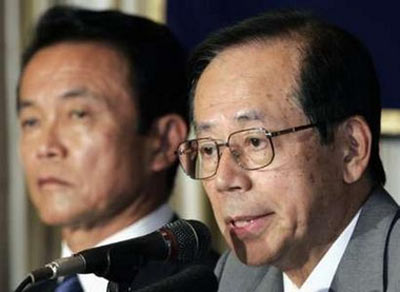Japan's former Chief Cabinet Secretary Yasuo Fukuda won the ruling Liberal Democratic Party's presidential election on Sunday, beating his rival the LDP Secretary General Taro Aso.
Fukuda grabbed 330 votes out of the eligible 527 votes from the LDP lawmakers and prefectural chapters to succeed Shinzo Abe. Former foreign minister Aso received 197 votes. There was one invalid ballot.
"I will endeavor to revive LDP," Fukuda told fellow LDP lawmakers after the election results were announced. He also vowed to regain public trust on the party at the short speech.
As the LDP controls the House of the Representatives, which has the final say in choosing the prime minister, Fukuda is set to be selected as prime minister by the parliament on Tuesday.
The 71-year-old veteran politician threw his hat in the ring to race against former foreign minister Taro Aso, after Prime Minister Shinzo Abe abruptly resigned on Sept. 12. During the campaign, Fukuda has vowed to boost public confidence in politics by making Japan a society with hope and security.
On foreign policies, Fukuda called for balance between Japan's alliance with the US and Japan's membership in Asia. He said that the Korean Peninsula nuclear issue and the abduction issue should be handled through dialogue.
Fukuda, the son of the late premier Takeo Fukuda, entered the political field as his father's secretary. The two Fukudas will be the first father-son premiers in Japan's politics. Takeo Fukuda was also elected as the LDP president at the age of 71. The LDP president usually serves a tenure of three years and a maximum of six years.
As the party's 22nd president, Fukuda is expected to decide new party executives on Monday. He would also announce new Cabinet lineup on Tuesday after being named prime minister.
Fukuda, from central Gunma prefecture, worked in an oil company for 17 years after he graduated from the renowned Waseda University. He was first elected to parliament in 1990 when he was 53.
He served as chief cabinet secretary under Yoshiro Mori and Koizumi's administrations with a combined tenure of three and a half years, the longest among top government spokespersons. In May 2003, Fukuda resigned after he admitted the failure to pay pension premiums.
(Xinhua News Agency September 24, 2007)


